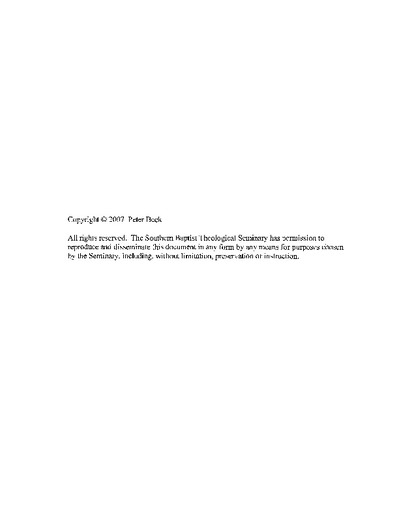The voice of faith: Jonathan Edwards's theology of prayer
Abstract
Jonathan Edwards has been described as the "theologian of the will," the "theologian of the heart," and the "theologian of revival." This dissertation seeks to prove that Edwards should rightly be called the "theologian of prayer."
Chapter 1 defines the parameters of this study and argues for the importance of Edwards's contribution to this area of practical theology.
Chapter 2 examines the nature of God the Father, asking and answering three questions regarding prayer: Who is God? Does God answer prayer? and, What about unanswered prayer?
Chapters 3, 5, and 7 examine Edwards's life and consider the role prayer played during three stressful times: his first pastorate, the First Great Awakening, and his dismissal from the church in Northampton.
Chapter 4 considers the role of Christ in prayer. The answer to two questions provides the outline for Edwards's Christology: Who is Jesus? and, What is Jesus doing?
Chapter 6 addresses the person and work of the Holy Spirit as it applies to prayer. Again, three questions drive the study: Who is the Holy Spirit? What does the Holy Spirit do? and, What does the Holy Spirit have to do with prayer?
Chapter 8 looks at the nature of man and the role of faith in prayer. The questions that undergird this chapter are: What did man have in the creation? What did man lose in the Fall? and, What can man have again in the recreation?
Chapter 9 summarizes Edwards's arguments and provides a brief exhortation to application.
This dissertation contends that Edwards believed that an accurate theology of prayer requires a right understanding of God and man, of the Trinity and man's needs, of divine grace and human faith. Ultimately, Edwards's theology of prayer begins and ends with God. In all of his Trinitarian glory, God is the source and the summa of all grace. In saving fallen men through faith, he resumes communion with them that they might glorify and enjoy him forever, that they might seek him and savor him.

